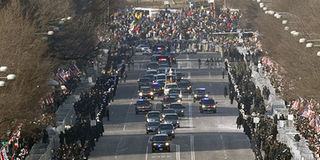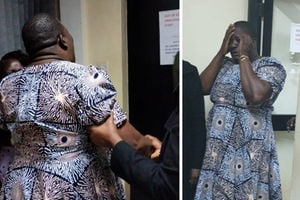Stark contrast between US and Kenya fetes

The presidential motorcade approaches Capitol Hill during the inauguration ceremony of Barack Obama as the 44th President of the United States, in Washington. PHOTO/ REUTERS
What you need to know:
- Obama took office 78 days after the polls while Kibaki was sworn in soon after the results
As Kenyans joined millions across the world to witness the historic swearing in of Barack Obama on Tuesday, they must have been struck by the stark contrasts between the Washington DC ceremony and similar events at home.
Mr Obama took office 78 days after winning the presidency in a ceremony witnessed by one of the largest crowds in America’s history.
Hundreds of thousands of people converged on Washington DC — in buses, trains and planes — from across the world to celebrate Obama’s inauguration.
Inaugural parade
After the oath, they watched the new president and his family ride in an inaugural parade along Pennsylvania Avenue to the White House.
After that, outgoing President George W. Bush — rated the most unpopular leader in American history — was escorted in a military plane to his home in Texas.
The organising committee threw 10 inaugural balls after the swearing-in.
Despite having been elected in November last year, Mr Obama rode into Washington on Saturday in a 10-car train retracing the route President Abraham Lincoln — his idol — took to the capital before he assumed the presidency in 1861.
Many other presidents had similar ideas for their arrivals in Washington. Lincoln and Franklin Roosevelt came slowly by train while Bill Clinton took a bus from Thomas Jefferson’s home outside Charlottesville.
Obama’s presidency presents a sense of hope and renewal for thousands of Americans who flocked Washington DC for the event.
Someone great
“He gave us something different to look forward to. I want my daughter to have a sense of feeling that even though people struggle, there is always a chance that you could be someone great,” said mother of two Donna Allen in Washington DC.
Former Nation political editor Emman Omari compares the excitement generated by Obama’s feat to the enthusiasm with which Kenyans welcomed Daniel Moi’s presidency in 1978 after Jomo Kenyatta’s as well as Mwai Kibaki’s 2002 election.
“Kenyans had a lot of faith in Moi’s presidency. It was a relief as it marked the end of what many perceived as the political dominance of a small clique of people,” he said.
Like Obama’s election, President Kibaki’s 2002 win was a milestone; the end of the Kanu dictatorship and dawn of optimism for thousands of jubilant Kenyans who thronged Uhuru Park to witness what they thought was the break of a new beginning. It was not to be.
In 2007, President Kibaki was sworn in in a hurried ceremony at the lawns of State House amid chaos across the country on a dark, cold evening in the presence of PNU members and a handful government officials, shortly after he was announced winner in a poll disputed by ODM rivals.
“A small cabal of politicians almost certainly stole the result by fraud. In the parliamentary vote, President Kibaki’s ruling party was routed. Yet in the presidential vote Mr Kibaki emerged victorious and was sworn in only a few minutes later, forestalling pleas from all sides,” The Economist wrote.
Violence errupted soon after leading to the death of nearly 1,300 Kenyans and displacement of thousands of others from their homes.
Unlike the US, Kenya’s poll system gives aggrieved parties no time to file any complaints before announcing the winner.
Instead, the law says they should seek redress in courts of law.




